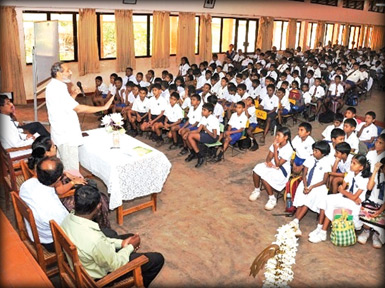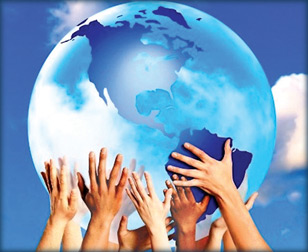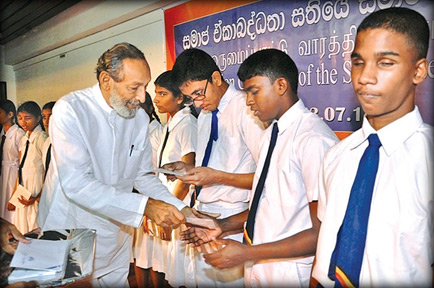|
National Social Integration week begins tomorrow:
Collective commitment, vital for unity
By Dhaneshi Yatawara
Society exerts a powerful force on individuals. in society everyone
gets equal opportunities, and one is assured of individual well-being
and quality of life. This creates a platform facilitating upward
mobility for all - regardless of race or religion.
 Be they young or old, abled or differently able, happy or sad, modern
or indigenous, all those in such a society will be assured of
socio-economic well-being and social justice. If all discrimination can
be ruled out and integrate all the backward, marginalised communities
into the social mainstream, ours will be the most beautiful
neighbourhood. Be they young or old, abled or differently able, happy or sad, modern
or indigenous, all those in such a society will be assured of
socio-economic well-being and social justice. If all discrimination can
be ruled out and integrate all the backward, marginalised communities
into the social mainstream, ours will be the most beautiful
neighbourhood.
A collective commitment is fundamental to empower those who have been
marginalised and excluded. It is in this context that Sri Lanka began to
celebrate a special social integration week since 2012. From tomorrow
this unique week will start creating a platform for all to participate
in it.
The annual Social Integration Week 2014 will be held from July 14 to
20 under the theme ‘National unity’ with a view to strengthening ethnic
coexistence. The Ministry of National Languages and Social Integration
organising the event has set the stage to celebrate the National Social
Integration Week on a grand scale with special events organised
countrywide. The objective is promoting national unity and unifying the
country on the basis of equality and to provide a forum to build a
positive and productive dialogue.
The Social Integration Week was inaugurated by President Mahinda
Rajapaksa in 2012 with a theme that enveloped objectives such as access
to education, economic activities, legal facilities, security and a safe
environment for everybody. This year, the Social Integration Week mainly
focuses on strengthening national unity. The inauguration ceremony will
be held at the royal residence of King Parakumbahu (Wijayanthi Prasada)
in Polonnaruwa.
Under the programs, two provincial centres for the Northern and
Sabaragamuwa provinces will be opened. The centre for the Northern
province is at Kilinochchi and the Sabaragamuwa centre at Kuruvita. A
program will be launched aiming to empower women leaders in the
Kilinochchi and Moneragala districts.
 It is time for the true Sri Lankans to show to the world what is
actually in their heart when the country is facing allegations and
accusations as a nation hating other communities. It is time to show
that the average citizen never hated and will never feel any hatred to
other communities. It is time to show the world that Sri Lanka cannot be
force-driven by any extremist group. It is time for the true Sri Lankans to show to the world what is
actually in their heart when the country is facing allegations and
accusations as a nation hating other communities. It is time to show
that the average citizen never hated and will never feel any hatred to
other communities. It is time to show the world that Sri Lanka cannot be
force-driven by any extremist group.
Informed society
Building an informed and integrated Sri Lankan society requires
conscious and concerted effort and strong, proactive collaboration among
State and civil society partners. The social integration week would be a
stepping stone to enhance the potential of these organisations to embark
on the principles of integration. It would be the catalyst to motivate a
social movement for a cohesive Sri Lanka founded on equality and a sense
of belonging based on understanding and mutual respect.
Thus, it’s time for Sri Lankans to move a step ahead and understand
the other areas that need integration in society. “Social integration is
not just about ethnicity. It is of a much broader perspective,” said
Secretary to the Ministry of National Languages and Social Integration
Malkanthi Wickramasinghe. “There are many other groups living in a
miserable condition and they need to be socially integrated to one Sri
Lanka,” said Wickramasinghe.
National event
The Ministry initiated the Social Integration Week since 2012 as an
annual national event in line with the National Policy Framework for
Social Integration. “The National Policy Framework for Social
Integration was formulated by an Inter-ministerial committee formulated
under the Ministry of Social Integration funded by the GIZ.
The Committee drafted the Action Plan to implement this framework,”
Wickramasinghe said. The policy framework identifies seven elements as
key components in social integration - i.e. justice, education, social
services, political participation, language, media, belonging and
responsibility.
 |
|

Giving priority to differently-abled children |
“We get the pulse of the people when we go to meet people in
different provinces. But all those opinions work isolated. There were
sporadic activities that came up in the recent past in the society
threatening the peaceful society. Various civil groups, religious
dignitaries pointed out to the minister that it’s time to bring in a
solution. He asked them what the Ministry needs to do. Then these people
said that there should be a some kind of a forum at least for the
citizens to know that unity is the need of the hour. In a diverse
society 100 percent unity will not be possible, yet it should be built
to affect the majority of the people. If people understand and accept
that, then only can we work to eliminate it,” Wickramasinghe said.
After three decades of terrorism we are enjoying a peaceful life for
nearly five years. Different communities lived apart taking in culture,
language, ethnicity as barriers. Slowly but steadily people are uniting
with other communities and are interested in learning the others’
language for a better understanding. School children from North and
South are meeting quite often and many groups are formed from the
communities to interact with others and slowly the misunderstandings
seem to be fading away.
Social integration
The highly sensitive diverse society in Sri Lanka demands a conscious
effort towards social integration. Three main pillars - ethics,
education and empowerment - essential in ensuring social integration to
bring in marginalised or excluded groups to the mainstream.
All citizens bear the responsibility, equally. The ministry is making
efforts to particularly popularise mainstreaming vulnerable groups and
mobilise language links and mass media as drivers for positive change.
“Social integration means not only addressing the question of
ethnicity and religion. But also looking into the disintegration of the
Sri Lankan community in terms of marginalisation due to poverty, caste
issues and social strata,” she said. Disintegrated people do not feel
that they belong to this country. Therefore they will not become
responsible citizens. It is this responsibility of all citizens that
helps strengthen existing initiatives for participatory and pluralistic
democratic governance. |

